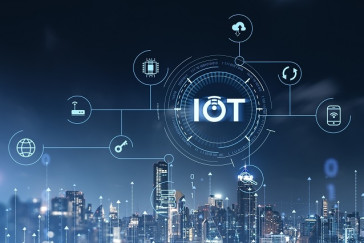A Tale Of Two Internets

Ok, folks. The time has finally come. Wave goodbye to the Internet we've come to know and love and say hello to the completely corporatized communications program (CCCP for short). Yes, it seems as though last week's rumors about the engagement between teh Google Empire and Verizon have come to fruition. The happy couple will be picking out their china pattern in due time.
The wedding announcement can be viewed here, for anyone interested in reading the gory details of this sordid affair's conclusion. The blogosphere is exploding with commentary, most of which focuses on the proposal's creation of two basically different internets. That kind of talk is decidedly over my head, so I won't pretend to understand something that's utter nonsense as far as I'm concerned. The only sense I can make out of all this is that Google and Verizon want to have a "free" internet and a faster pay service, sort of like the system of network and cable television. Bummer. Anyone who's tried to watch basic cable knows exactly what I'm lamenting. As a rule, network television sucks because, in a capitalist economy, you get what you pay for. Hence the squawking over the so-called "free" internet, which will probably be about as entertaining and exciting as watching professional golf.
But enough about that. I have nothing of substance to add to such discussions, so let's move on to some of the legal aspects of this deal. First of all, this isn't a piece of legislation, although it surely has statutory envy. In fact, the way this whole thing plays out will tell us quite a lot about our form of government. In other words, should the government get down on its hands and knees and accept this offering, well, we'll know to finally abandon all democratic pipe dreams. You see, in a real democracy, the legislature writes the laws, not the corporations. No, they're supposed to be the ones who are subject to governmental regulations. What we have here is a classic case of the fox guarding the hen house, and any government worth its salt would issue an immediate order to cease and desist. Thus far, the gubermint has done no such thing, but I'm willing to give them time to collect themselves.
There are two parts of this document that I find especially problematic. Here's the first one:
"Non-Discrimination Requirement: In providing broadband Internet access service, a provider would be prohibited from engaging in undue discrimination against any lawful Internet content,application, or service in a manner that causes meaningful harm to competition or to users.Prioritization of Internet traffic would be presumed inconsistent with the non-discrimination standard, but the presumption could be rebutted."
Anyone with the slightest amount of legal training knows that this kind vague diction serves a sinister purpose. While this sounds like they're throwing consumers a bone, this passage is meant to do the exact opposite. The operative word is "undue" discrimination, which is a lawyer's way of saying that a certain degree of discrimination is acceptable and indeed permissible. Consider the Supreme Court's usage of the "undue burden test," (Planned Parenthood v Casey 1992)crafted by Justice Sandra Day O'Connor to justify limitations on reproductive rights. I don't think I'm going out on a limb here in suggesting there's a legal parallel afoot. This kind of balancing is totally arbitrary and is designed to legitimize questionable judicial interpretations of what precisely constitutes content discrimination.

The presumption of inconsistency is particularly clever in terms of its capacity to deceive. The ensuing clause reveals their true intentions because it gives companies a chance to defend their actions during the litigation process, instead of simply banning these practices altogether. Why bother leaving wiggle room for reprehensible behavior? Why to prepare a line of defense, naturally. Since a federal judge could be persuaded into accepting that Google's page ranks are opinions entitled to First Amendment Freedom of Speech protections, consumers should be prepared to lose legal challenges on ridiculous grounds. Remember, corporations have more or less inexhaustible resources at their disposal to make law suits disappear; calling their track record impressive would be a prime candidate for understatement of the year.
The other passage that scares me reads as follows:
"Case-By-Case Enforcement: The FCC would enforce the consumer protection and nondiscrimination requirements through case-by-case adjudication, but would have no rulemaking authority with respect to those provisions. Parties would be encouraged to use non-governmental dispute resolution processes established by independent, widely-recognized Internet community governance initiatives, and the FCC would be directed to give appropriate deference to decisions or advisory opinions of such groups. The FCC could grant injunctive relief for violations of the consumer protection and non-discrimination provisions. The FCC could impose a forfeiture of up to $2,000,000 for knowing violations of the consumer-protection or non-discrimination provisions. The proposed framework would not affect rights or obligations under existing Federal or State laws that generally apply businesses, and would not create any new private right of action."
I don't even know where to begin with this monstrosity. The clause establishing a case-by-case system of adjudication makes ad hoc decisions mandatory and eliminates the FCC's ability to enact any kind of meaningful regulations. The ditty about using "non-governmental dispute resolution processes" couldn't be more transparent an effort to circumvent the courts and lawmakers entirely in one fell swoop. The word "could" is critical to comprehending this piece of claptrap, too. In law, there's a huge difference between the terms must, may, and may not. Could falls in the same category as may in this instance, which implies the FCC the right fine people or to do absolutely nothing.
My advice is to enjoy the interwebs now because things about to change on a fundamental level. Unless, of course, the government decides to, ya know, govern.
This content was created by AI





